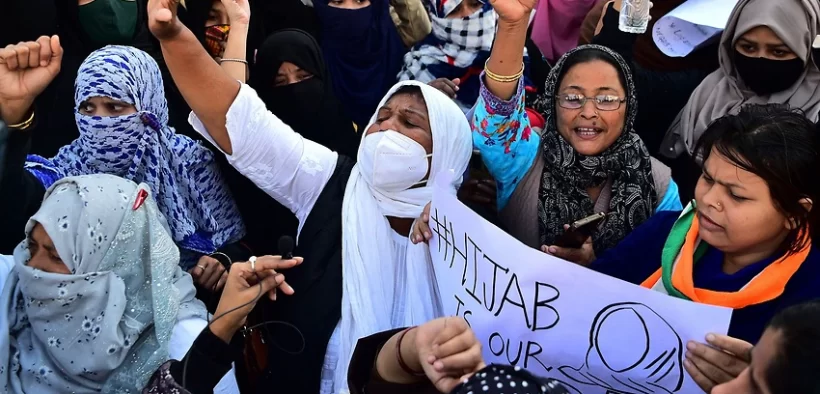“They are making us choose between our faith and our education,” she said.
“What kind of equality is this?
“It’s a small thing, it’s a basic right. “We never thought it would go so far.”
In response, Hindu teenagers in Udupi have repeatedly gathered in saffron-coloured shawls symbolising their own religion.
Hindu students have mounted counter-protests, flocking to schools in recent days in support of the ban, forcing the Karnataka state government to shut schools and colleges for three days to ease tensions between the two communities.
Members and supporters of the All India Majlis-E-Ittehadul Muslimeen (All India Council for Unity of Muslims) political party hold a protest in New Delhi on 9 February, 2022, against the hijab ban. Source: AAP
“We will keep protesting until the government stops insulting the students,” said Tasmeen Sultana, one of the Muslim protesters.
“We want our fundamental rights back … you cannot take away our rights.”
Protests have been held in many of India’s biggest cities, including Delhi, Mumbai and Kolkata, as well as in neighbouring Muslim-majority Pakistan – where the foreign ministry summoned an Indian diplomat to protest.
And Pakistan’s Nobel laureate winner Malala Yousafzai – awarded the prize for her work for female education – expressed her support for the girls.
“Refusing to let girls go to school in their hijabs is horrifying. Objectification of women persists – for wearing less or more,” Malala Yousafzai said in a tweet late on Tuesday.
Opposition parties and critics accuse the BJP government at federal and state levels of discriminating against the minority Muslim population.
Mr Modi and his government have defended his record and say the economic and social policies benefit all Indians.
Udupi’s BJP MP Raghupathi Bhat insisted that the measure was driven by school uniform rules and that hijabs were allowed up to the classroom door.
“When you sit in the classroom you are equal,” he said. “In education, don’t bring religious matters.”
SBS













